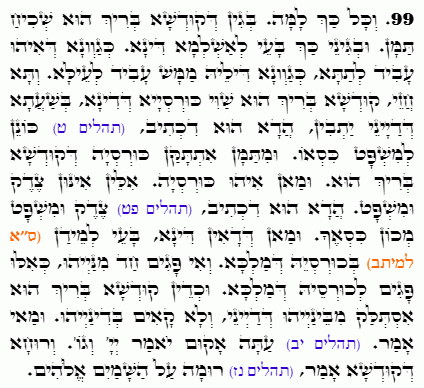Daily Zohar # 4605 – Kedoshim – He shall judge the world in righteousness
Daily Zohar 4605

Hebrew translation:
.
Zohar Kedoshim
Continued from previous DZ
#99
And why is all this so? It is because the Holy One, Blessed be He, is present there, in the place of judgment (מִשְׁפָּט). Therefore, the judgment must be completed properly. Just as it is done below, so does the Holy One, Blessed be He, do above. Come and see, the Holy One, Blessed be He, establishes the seat of judgment when the judges sit. As it is written,
Psalm 9:8
“וַיהוָה לְעוֹלָם יֵשֵׁב כּוֹנֵן לַמִּשְׁפָּט כִּסְאוֹ.”
“He shall judge the world in righteousness, And He shall administer judgment for the peoples in uprightness.”
From there, the throne of the Holy One, Blessed be He, which is Binah, is established. And what is His throne? These are righteousness (צדק) and judgment (מִשְׁפָּט). As it is written,
Psalms 89:15
“צֶדֶק וּמִשְׁפָּט מְכוֹן כִּסְאֶךָ חֶסֶד וֶאֱמֶת יְקַדְּמוּ פָנֶיךָ.”
“Righteousness and justice are the foundation of Your throne; Mercy and truth go before Your face.”
And whoever judges a case must sit on the king’s throne. If he mars one of them, it is as if he mars the king’s throne. Then, the Holy One, Blessed be He, withdraws from among the judges, and He does not stand in their judgment. What is said, then?
Psalms 12:6
“מִשֹּׁד עֲנִיִּים מֵאַנְקַת אֶבְיוֹנִים עַתָּה אָקוּם יֹאמַר יְהוָה אָשִׁית בְּיֵשַׁע יָפִיחַ לוֹ.”
“For the oppression of the poor, for the sighing of the needy, Now I will arise,” says YHVH; “I will set him in the safety for which he yearns.”
And the Holy Spirit says,
Psalms 57:6
“רוּמָה עַל הַשָּׁמַיִם אֱלֹהִים עַל כָּל הָאָרֶץ כְּבוֹדֶךָ.”
“Be exalted, O God, above the heavens; Let Your glory be above all the earth.”
Lesson;
The presence of the Holy One, Blessed be He, in the place of judgment emphasizes the sacredness and importance of justice being carried out correctly. Since the actions of judges on earth reflect the actions above, they need to make impartial judgments. Any corruption or bias mars the judgment’s integrity, negating the Torah laws, analogous to marring the Holy throne.
This Zohar teaching underscores the profound responsibility of judges to administer justice fairly and impartially, reflecting the righteousness of Hashem’s judgment. Judges in this world have the sacred duty to uphold the integrity of judgment because there is a connection between justice made in this world and the upper levels.
{||}

 Previous: Kedoshim
Previous: Kedoshim

